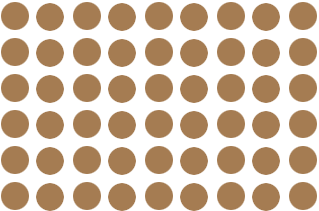Cool 6-Digit Numbers
Let us call a 6 -digit number cool if each of its digits is no less than the preceding digit. How many cool 6 -digit numbers are there?
Details And Assumptions:
-
For example, 1 1 2 4 4 6 is cool .
-
2 3 3 0 4 3 isn't cool .
The answer is 3003.
This section requires Javascript.
You are seeing this because something didn't load right. We suggest you, (a) try
refreshing the page, (b) enabling javascript if it is disabled on your browser and,
finally, (c)
loading the
non-javascript version of this page
. We're sorry about the hassle.
4 solutions
+1 nice solution
First thing that is obvious is that we can't make it cool if select 0 as a digit because if we take 0 as a digit then we would have to place it at left most place and then it wouldn't be a 6 digit number.
Another thing to note is that for every selection there is only one way to arrange it into an cool number.
Now the thing left is counting the number of distinct selections.
We have to select total of 6 digits with repetitions of digits allowed.
Let x i be the number of times digit i is selected, i = 1 , 2 , 3 , 4 , 5 , 6 , 7 , 8 , 9
Basically we have to find the number of integral solutions of :
x 1 + x 2 + x 3 + x 4 + x 5 + x 6 + x 7 + x 8 + x 9 = 6
That is simply 1 4 C 6
I did by same way
You see, for any collection of 6 digits , you can only have one way to make it cool, because there is only one way of arrangeing it as a non decreasing series,
and also for every collection , there exists surely one way of making it cool, i shall take these conditions for granted, without proving them. (because i cant, but i think they are obvious)
Now , surely we cant have a 0 anywhere, because if we got one, we have to place it in the first box (from left) and hence it wont be a 6 digit number,
Now, the question simply becomes how many distinct collections are possible with 6 digits per collection all belonging to (1 to 9) and repition is allowed,
Or, 111678 is different from 166678, even though both have the same distinct digits 1678,
now there are following 6 possibilities,
a) all digits distinct which is obviously 9C6
b) 5 distinct digits, obviously 9C5*5
(9C5 ways of choosing distinct terms and , 5 ways of choosing one to repeat ,
eg- 112456 and 221456)
c) 4 distinct digits, 9C4*(4C2+4)
(9C4 ways of choosing distinct digits and now either repeat one of them thrice or any two of them each once)
d) 3 distinct digits 9C3 (1+2 3C2+3)
(9C3 ways of choosing,, now either repeating one of them four times, or repeating any two of them with still one of them appearing thrice, other twice, and finally repeating all three of them each twice)
e) 2 distinct digits
9C2*(1+2+2)
(9C2 ways of choosing, now either repeating both of them each thrice, or one of them 4 times other once , and finally any one of them is repeated 5 times)
f) 1 distince digit, simple 9 ways
Now add them all up, and you get 3003
Do share if you have a better method
This is a non-complicated solution:
1.Draw a 9*6 array
 2. Label the bottom left point one.
3. Use Pascal's Triangle
4. When you are done with that, add up everything on the 1st row and I am pretty sure you should get 3003.
2. Label the bottom left point one.
3. Use Pascal's Triangle
4. When you are done with that, add up everything on the 1st row and I am pretty sure you should get 3003.
Could you please explain how this works
To avoid casework, we establish 6 bijections. -
Let the number be x 1 x 2 x 3 x 4 x 5 x 6 .
Then we have x i ∈ { 1 , 2 , ⋯ , 9 } and x 1 ≤ x 2 ≤ ⋯ ≤ x 6 .
Substitute y 1 = x 1 , y 2 = x 2 + 1 , ⋯ ⋯ , y 6 = x 6 + 5 .
Clearly, y 1 < y 2 < ⋯ < y 6 . Also, by fixing y i , x i gets fixed. Therefore, all we need to do is select 6 numbers ( y i ) from the set { 1 , 2 , ⋯ , 1 4 } so that all the y i get fixed.
Hence, the final answer is ( 6 1 4 ) = 3 0 0 3 .